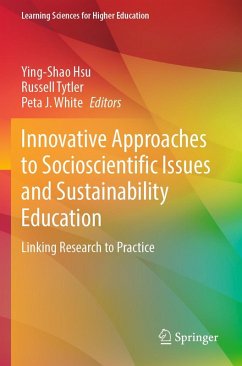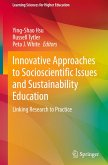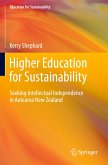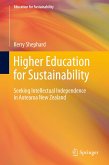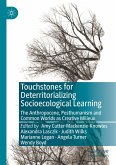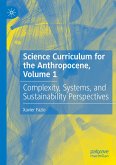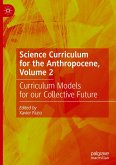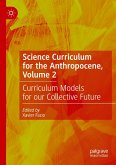Innovative Approaches to Socioscientific Issues and Sustainability Education
Linking Research to Practice
Herausgegeben:Hsu, Ying-Shao; Tytler, Russell; White, Peta J.
Innovative Approaches to Socioscientific Issues and Sustainability Education
Linking Research to Practice
Herausgegeben:Hsu, Ying-Shao; Tytler, Russell; White, Peta J.
- Broschiertes Buch
- Merkliste
- Auf die Merkliste
- Bewerten Bewerten
- Teilen
- Produkt teilen
- Produkterinnerung
- Produkterinnerung
This book explores innovative approaches to teacher professional learning, examples of teaching enacted in classrooms, and factors affecting the promotion of quality teaching in socio-scientific issues and sustainability contexts. Since educational settings and cultures influence teaching, the different approaches and perspectives in various cross-national contexts enable us to appreciate the diversity of different countries' practices and provide insight into seminal approaches to socio-scientific issues-based teaching internationally. The book consists of three parts: innovative professional…mehr
Andere Kunden interessierten sich auch für
![Innovative Approaches to Socioscientific Issues and Sustainability Education Innovative Approaches to Socioscientific Issues and Sustainability Education]() Innovative Approaches to Socioscientific Issues and Sustainability Education119,99 €
Innovative Approaches to Socioscientific Issues and Sustainability Education119,99 €![Higher Education for Sustainability Higher Education for Sustainability]() Kerry ShephardHigher Education for Sustainability38,99 €
Kerry ShephardHigher Education for Sustainability38,99 €![Higher Education for Sustainability Higher Education for Sustainability]() Kerry ShephardHigher Education for Sustainability38,99 €
Kerry ShephardHigher Education for Sustainability38,99 €![Touchstones for Deterritorializing Socioecological Learning Touchstones for Deterritorializing Socioecological Learning]() Touchstones for Deterritorializing Socioecological Learning67,99 €
Touchstones for Deterritorializing Socioecological Learning67,99 €![Science Curriculum for the Anthropocene, Volume 1 Science Curriculum for the Anthropocene, Volume 1]() Xavier FazioScience Curriculum for the Anthropocene, Volume 197,99 €
Xavier FazioScience Curriculum for the Anthropocene, Volume 197,99 €![Science Curriculum for the Anthropocene, Volume 2 Science Curriculum for the Anthropocene, Volume 2]() Science Curriculum for the Anthropocene, Volume 2104,99 €
Science Curriculum for the Anthropocene, Volume 2104,99 €![Science Curriculum for the Anthropocene, Volume 2 Science Curriculum for the Anthropocene, Volume 2]() Science Curriculum for the Anthropocene, Volume 2104,99 €
Science Curriculum for the Anthropocene, Volume 2104,99 €-
-
-
This book explores innovative approaches to teacher professional learning, examples of teaching enacted in classrooms, and factors affecting the promotion of quality teaching in socio-scientific issues and sustainability contexts. Since educational settings and cultures influence teaching, the different approaches and perspectives in various cross-national contexts enable us to appreciate the diversity of different countries' practices and provide insight into seminal approaches to socio-scientific issues-based teaching internationally. The book consists of three parts: innovative professional development programs, innovative teaching approaches, and issues relating to student engagement with socio-scientific issues and sustainability education. The book targets those who can be expected to develop curriculum, enact teaching practices, and facilitate teachers' professional development in socio-scientific issues and sustainability education.
Produktdetails
- Produktdetails
- Learning Sciences for Higher Education
- Verlag: Springer / Springer Nature Singapore / Springer, Berlin
- Artikelnr. des Verlages: 978-981-19-1842-1
- 1st edition 2022
- Seitenzahl: 408
- Erscheinungstermin: 3. August 2023
- Englisch
- Abmessung: 235mm x 155mm x 23mm
- Gewicht: 616g
- ISBN-13: 9789811918421
- ISBN-10: 9811918422
- Artikelnr.: 68377328
- Herstellerkennzeichnung Die Herstellerinformationen sind derzeit nicht verfügbar.
- Learning Sciences for Higher Education
- Verlag: Springer / Springer Nature Singapore / Springer, Berlin
- Artikelnr. des Verlages: 978-981-19-1842-1
- 1st edition 2022
- Seitenzahl: 408
- Erscheinungstermin: 3. August 2023
- Englisch
- Abmessung: 235mm x 155mm x 23mm
- Gewicht: 616g
- ISBN-13: 9789811918421
- ISBN-10: 9811918422
- Artikelnr.: 68377328
- Herstellerkennzeichnung Die Herstellerinformationen sind derzeit nicht verfügbar.
Ying-Shao Hsu is Professor of Graduate Institute of Science Education and the Department of Earth Sciences, as well as Vice President for Research and Development at the National Taiwan Normal University (NTNU). She received her Ph.D. degree in 1997 from the department of curriculum and instruction at the Iowa State University. Her research focuses on inquiry learning, science curriculum design, metacognition, social-scientific issue education, and STEM education. Professor Hsu's research work has been recognized with Outstanding Research Awards by the Minister of Science Technology in Taiwan (2011 & 2015), National Science Council Reward Special Talents (2010 & 2011), National Taiwan Normal University Research Awards (2005, 2006, 2007, 2008, & 2012), and Wu Da-Yu Memorial Award (2005). She held the position of Research Chair Professor at NTNU for the periods January 2016-December 2018 and October 2012-January 2015. Currently, she is Chair Professor of NTNU. Russell Tytler is Alfred Deakin Professor and Chair of Science Education at Deakin University, Australia. He received his Ph.D. degree from Monash University in 1995. He has researched and written extensively on student learning and the role of representation as a multimodal language for reasoning in science, on teacher learning, socio-scientific reasoning and interdisciplinarity, school-community partnerships, and STEM curriculum policy and practice. He is Fellow of the Academy of Social Sciences in Australia. He has written a number of influential government reports, been active in curriculum development, has been Member of the Science Expert Group for PISA 2015 and 2024, and Member of the advisory group for the European PARRISE project focused on socio-scientific issues. Peta White is Senior Lecturer of Science and Environmental Education, School of Education, Deakin University. Peta has worked in classrooms, as Curriculum Consultant and Manager, andas Teacher Educator in several jurisdictions across Canada and Australia. Peta gained her Ph.D. in Saskatchewan, Canada, where she focussed on learning to live sustainably which became a platform from which to educate future teachers. Peta's current research interests follow three directions including science and biology education, sustainability, climate change, and environmental education, and collaborative/activist research.
Chapter 1 Overview of Socio-Scientific Issues and Sustainability Education.- Part I Innovative Approaches to Teacher Professional Learning.- Chapter 2 Pre-Service Teachers Representing Socio-Scientific Aspects of Scientists' Work.- Chapter 3 Learning to Teach Socio-Scientific Issues: Emotional Experiences of Pre-Service Science Teachers.- Chapter 4 Pre-Service Secondary Science Teachers' Views on Teaching Socio-Scientific Issues.- Chapter 5 Teaching SSI: Implications with Respect to Teachers' Professional Identity.- Chapter 6 Towards a Sustainable Future through Novel Climate Change Teacher Education.- Chapter 7 Responsible Research, Innovation and Socio-Scientific Inquiry Approaches in a European Teacher Education Project.- Chapter 8 In-Service Teachers' Professional Development of SSI-Based Teaching and Learning.- Chapter 9 Supporting Science Teachers' Professional Development and Teaching Practices: A Case Study of SSI-Based Instruction.- Chapter 10 Preparing Science Teachers to Teach Socio-Scientific Decision Making and to Overcome Their Difficulties.- Chapter 11 Teachers' Professional Learning Community for Sustainability.- Part II Innovative Approaches to Teaching.- Chapter 12 Sustainability Issues in Lower Secondary Science Education: A Socio-Scientific, Inquiry-Based Approach.- Chapter 13 Education for Environmental Citizenship Pedagogical Approach: Innovative Teaching and Learning for a Sustainable Future.- Chapter 14 Educational Potentialities of Student-Curated Exhibitions on Socioscientific Issues: The Students' Perspective.- Chapter 15 SSI for Scientific Literacy and Citizenship: Assembling the Puzzle Pieces.- Chapter 16 Design and Implementation of a Socio-Scientific Board Game in a General Education Course.- Chapter 17 Futures-Focused Teaching and Learning of Climate Change: An Exploration into Students' Perceptions of the Climate Future.- Chapter 18 Students' Prior Knowledge, Perceptions of Climate Change, Conceptual Understanding, and Scientific Explanation of Global Warming: A Partial Least Squares Analysis.- Chapter 19 The Influence of Reasoning Context on Undergraduate Students' Reading Process and Reasoning Quality of a Socio-Scientific Issue.- Chapter 20 Using the Socio-Scientific Issue (SSI) of Climate Change as a Context to Develop Year 10 Science Students' Decision-Making Skills.- Part III Reflections and Epilogue.- Chapter 21 Politicized Socio-Scientific Issues Education Promoting Social Justice & Environmental Vitality.- Chapter 22 Teaching SSIs - An Epistemology Based on Social Justice through the Metatheory of Critical Realism.- Chapter 23 Epilogue.
Chapter 1 Overview of Socio-Scientific Issues and Sustainability Education.- Part I Innovative Approaches to Teacher Professional Learning.- Chapter 2 Pre-Service Teachers Representing Socio-Scientific Aspects of Scientists' Work.- Chapter 3 Learning to Teach Socio-Scientific Issues: Emotional Experiences of Pre-Service Science Teachers.- Chapter 4 Pre-Service Secondary Science Teachers' Views on Teaching Socio-Scientific Issues.- Chapter 5 Teaching SSI: Implications with Respect to Teachers' Professional Identity.- Chapter 6 Towards a Sustainable Future through Novel Climate Change Teacher Education.- Chapter 7 Responsible Research, Innovation and Socio-Scientific Inquiry Approaches in a European Teacher Education Project.- Chapter 8 In-Service Teachers' Professional Development of SSI-Based Teaching and Learning.- Chapter 9 Supporting Science Teachers' Professional Development and Teaching Practices: A Case Study of SSI-Based Instruction.- Chapter 10 Preparing Science Teachers to Teach Socio-Scientific Decision Making and to Overcome Their Difficulties.- Chapter 11 Teachers' Professional Learning Community for Sustainability.- Part II Innovative Approaches to Teaching.- Chapter 12 Sustainability Issues in Lower Secondary Science Education: A Socio-Scientific, Inquiry-Based Approach.- Chapter 13 Education for Environmental Citizenship Pedagogical Approach: Innovative Teaching and Learning for a Sustainable Future.- Chapter 14 Educational Potentialities of Student-Curated Exhibitions on Socioscientific Issues: The Students' Perspective.- Chapter 15 SSI for Scientific Literacy and Citizenship: Assembling the Puzzle Pieces.- Chapter 16 Design and Implementation of a Socio-Scientific Board Game in a General Education Course.- Chapter 17 Futures-Focused Teaching and Learning of Climate Change: An Exploration into Students' Perceptions of the Climate Future.- Chapter 18 Students' Prior Knowledge, Perceptions of Climate Change, Conceptual Understanding, and Scientific Explanation of Global Warming: A Partial Least Squares Analysis.- Chapter 19 The Influence of Reasoning Context on Undergraduate Students' Reading Process and Reasoning Quality of a Socio-Scientific Issue.- Chapter 20 Using the Socio-Scientific Issue (SSI) of Climate Change as a Context to Develop Year 10 Science Students' Decision-Making Skills.- Part III Reflections and Epilogue.- Chapter 21 Politicized Socio-Scientific Issues Education Promoting Social Justice & Environmental Vitality.- Chapter 22 Teaching SSIs - An Epistemology Based on Social Justice through the Metatheory of Critical Realism.- Chapter 23 Epilogue.

